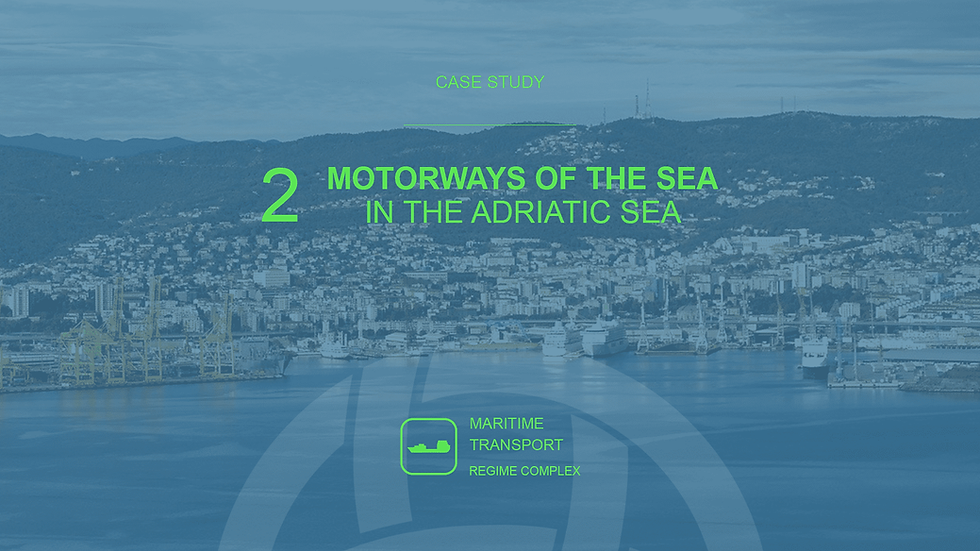Motorways of the Sea in the Adriatic Sea: An introduction to Case Study 2
- pavel874
- Aug 9, 2023
- 3 min read
Updated: Nov 5, 2023

This case study focuses on improving the Motorways of the Sea programme (MoS), as part of the trans-European Transport Network (TEN-T). This improvement is sought by supporting Short-Sea Shipping (SSS) and Inland Waterway Transport (IWT) policy frameworks. The TEN-T Regulation (COM(2021) 812 final) on the legislative proposal for the revision of Regulation (EU) 1315/2013) is currently being revised to assist the transfer of freight from road to sea, and to integrate shipping routes, ports and land corridors in accordance with the EU Green Deal. The EC recently tabled the action plan ‘NAIADES III’ (COM(2021) 324 final), which formulates the conditions for the IWT sector to make the shift towards a zero emission and digital economy. The EU is also reviewing the Combined Transport Directive (Directive 92/106/EEC) to fulfil the targets for market share growth of SSS and IWT. Port development is essential in this respect. Ports are the gateways linking maritime corridors with land-based networks of production and consumption. PERMAGOV will address the governance and e-governance challenges associated with the construction and maintenance of port terminal infrastructure linked to the creation of new SSS and IWT routes. To do so, the project will formulate strategies to improve their performance as part of the implementation of the EU Green Deal.
PERMAGOV will also consider the introduction of automated vessel concepts, and how ports and inland waterways are digitally equipped to service such vessels. The regional scope of the analysis of this case is the Adriatic Sea. The South-East Europe motorway of the sea is a maritime corridor that connects the Adriatic Sea to the Ionian and the Aegean Seas. It is a key component of the EU Strategy for the Adriatic and Ionian Region (EUSAIR) on maritime transport (COM(2014) 357 final). A coalition of port actors emerged to answer maritime transport issues in the North Adriatic leg of this corridor. The North Adriatic Ports Association (NAPA) is a trilateral cross-border cooperation between the port authorities of Venezia, Trieste and Ravenna (Italy), Koper (Slovenia) and Rijeka (Croatia). Recently NAPA committed to cooperate on the implementation of “green port” policies and “smart port” policies, including through harmonised use of ICT (SPEECH/21/6610). PERMAGOV will analyse this cooperation dynamic to understand how port actors interact with national governments to implement the EU Green Deal via their port development plans, namely by fostering SSS and IWT connections.
Scope
Geographically, the case focuses on the Adriatic Sea, a semi-enclosed sea previously accounted for three riparian States: Albania, Italy, and Yugoslavia. The dissolution of the Socialist Federal Republic of Yugoslavia (SFRY) in the early 1990s has led to the establishment of four new littoral States: Croatia, Bosnia-Herzegovina, Montenegro, and Slovenia. Generally, the Adriatic’s ecosystem is particularly vulnerable as its waters are shallow and the exchange or renewal of waters with the Ionian Sea through the relatively narrow Strait of Otranto is limited.
There are major oil and liquid natural gas (LNG) transportation routes stretching to the northern Adriatic ports of Trieste, Venice, Porto Levante, Omišalj, and Koper. Major container ports are Trieste, Koper, Venezia, Ravenna, and Rijeka. The increasing human use of the marine and coastal space, in particular through (over)fishing, maritime transport, tourism, construction, and – in the Northern Adriatic – the exploration and exploitation of hydrocarbons has intensified the pressure on the entire ecosystem of the Adriatic.
Assumptions
The case study will test four assumptions:
Autonomous navigation enables the modal shift
Digitalisation of processes levels the playing field
Some industries will be disrupted as the modal shift happens
The modal shift is not a top-down decision, but one that is driven by shippers
Research questions
The case study aims to answer the following research questions:
What is the existing institutional setting for MoS in Europe?
How do stakeholders in the North Adriatic Sea cooperate around maritime transport?
What electronic tools are used to support short sea shipping in the region?
What institutional barriers prevent the shift of cargo from road to sea in the North Adriatic Sea?
How do institutional barriers, collaborations and e-governance interplay in the context of furthering the shift of cargo from road to sea in the North Adriatic region?
What is the impact of technology (automation, digitalization etc.) in shifting cargo from road to sea in the North Adriatic Sea?
PERMAGOV partners
The case study is managed by the Centre for Blue Governance in cooperation with the European Shippers Council (ESC). For ESC, the case study presents an opportunity to share the voice of shippers on the modal shift from road to sea transport. At the same time, new research knowledge will help ESC to shape its future positions on various shipping measures related to the European Green Deal.
Connections with other case studies
Decarbonising shipping: Changing environmental standards applicable to shipping has an impact on how logistics is organised









Comentarios